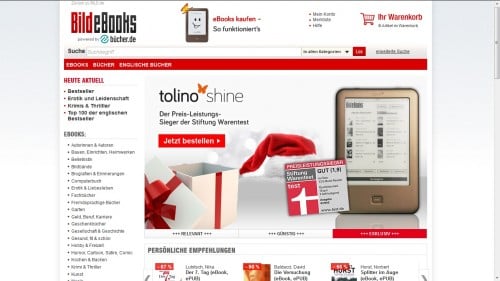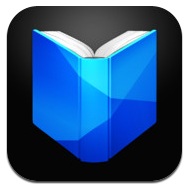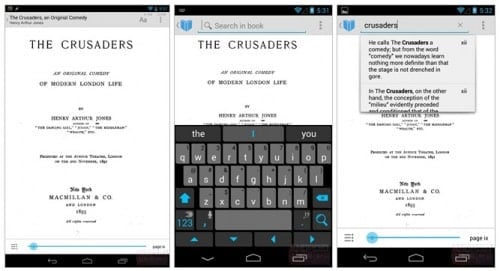The Digital Reader |
- The Morning Coffee – 13 December 2013
- Fiction Bundle Offers a 6-eBook Sci-Fi Bundle for $6
- German Newspaper Bild Launches eBookstore, Now Sells Tolino eBook Readers
- Are Deep Discount Sales Blasts Like Bookbub’s Still Effective Sales Tools?
- New Pew survey helps show need for full-strength digital libraries— especially if we’re to help Hispanics, African-Americans and the poor.
- Google Play Books for iPad Updated With Better Support For Scanned Books
| The Morning Coffee – 13 December 2013 Posted: 12 Dec 2013 09:40 PM PST Top stories this morning include a look at which authors’ works would enter the public domain next month if the US had reasonable copyright laws (link), another author turning down a book deal (link), the best literary feuds of the past year (link), and more.
The post The Morning Coffee – 13 December 2013 appeared first on The Digital Reader. |
| Fiction Bundle Offers a 6-eBook Sci-Fi Bundle for $6 Posted: 12 Dec 2013 05:50 PM PST If you have Fiction Bundle released their first bundle earlier this week. They’re offering a collection of 6 titles with the low low price of $6. It’s called the Chapter One bundle, and includes:
The ebooks are available in DRM-free PDF, Kindle, and Epub, and the minimum asking price is $6. That differs from Humble Bundle, which pioneered the current bundle model, but like HB Fiction Bundle lets the buyer choose to pay extra. You can also choose how to divide the payment between the authors, the 2 charities, and (if you like) the Fiction Bundle admins. You can of course pay more than $6, and if your payment exceeds $10 you can get the bonus title: The Complete Stories of Tim Pratt (So Far). In case you are interested, here are links to Amazon for 5 of the titles (the last 2 are not available in the Kindle Store; one technically has not been published yet). Curiously enough, one of the titles that’s not available in the Kindle Store is available direct from the author in another bundle. Deal Wesley Smith, author of Dust and Kisses, launched his own monthly bundles back in September. He charges $7 a month for the ebook edition, and if you prefer paper you can get a bundle as a trade paperback for $13. Smith’s bundles consist only of his work. The first 2 bundles each contain a novel, several short stories, and chunks of several novels that are being serialized across multiple bundles. If you are a fan of Dean Wesley Smith then his bundles are a good deal. As for me, I don’t like any single author that much. The post Fiction Bundle Offers a 6-eBook Sci-Fi Bundle for $6 appeared first on The Digital Reader. |
| German Newspaper Bild Launches eBookstore, Now Sells Tolino eBook Readers Posted: 12 Dec 2013 01:20 PM PST The Tolino Germany’s leading tabloid Bild announced that they are expanding their content store. Bild.de already sells video and offers a subscription music service, and as of this morning they launched a new ebookstore at ebooks.bild.de. This store is being operated in partnership with the media retailer Buecher.de, and it draws its ebook catalog from the Tolino platform. The site stocks millions of titles, and is already selling the 99 euro Tolino Shine. The Bild catalog includes bestsellers, novels, biographies, guidebooks and photo books, as well as a line of reissued public domain novels by authors such as Daniel Defoe, Alexandre Dumas, Mark Twain and Jules Verne, with prices starting at under 1 euro. The ebooks are sold in Epub, and they can be read on the Tolino Shine, as well as on any ereader or reading app which supports Adobe DE DRM. On a related note, Bild is also selling paper books. So how did a German tabloid come to launch an ebookstore? This initially confused me, but after I asked Johannes Haupt of lesen.net he explained the connections between Tolino, Bild, and Bluecher. The first thing you should know is that Buecher.de has been part of Tolino since that platform launched in March of this year, and has been selling ebooks for all of that time. That name has not come up before on this blog, but it turns out that it is owned in part by Weltbild, one of the original 5 Tolino partners. Buecher.de is also owned in part by Holtzbrink (which also owns Macmillan and the Skoobe ebook subscription service). And Buecher’s third owner is the publishing conglomerate Axel Springer, which also owns Bild.de. Once you know who owns whom it makes a lot more sense, doesn’t it? The Tolino consortium, when viewed as a group and not nearly a dozen different ebookstores, is either the first or second largest ebook platform in Germany. It’s not clear at this time whether the Kindle has a larger market share, but I suspect that it does. The Tolino platform was announced in March along with the Tolino Shine ereader, which has a 6″ Pearl HD E-ink screen. Tolino has since launched an updated Shine as well as a couple Android tablets. The post German Newspaper Bild Launches eBookstore, Now Sells Tolino eBook Readers appeared first on The Digital Reader. |
| Are Deep Discount Sales Blasts Like Bookbub’s Still Effective Sales Tools? Posted: 12 Dec 2013 10:31 AM PST What with Renée Pawlish, writing over at her indie publishing blog To Become a Writer, raises questions about Bookbub and hints that there are behind the scenes rumblings. She doesn’t get into specific figures, but it was enough of a teaser to get me interested:
This isn’t the first time I have read someone questioning the value of Bookbub or the service they offer. Jane Litte, writing over at Dear Author, noted about a month ago that discounted ebooks (like the ones that Bookbub often promotes) aren’t getting her attention (as a reader and buyer) quite so much anymore. She’s simply seeing too many good deals:
So is Bookbub becoming less effective? I’m not an author and I’ve never used the service, so I can’t speak from experience. But I can note that the service still has its proponents over on KBoards. Bookbub had its supporters among indie authors, with several on KBoards noting that their book had placed high on the Kindle Store’s best-seller list as a result. Jack Killborn has even shared actual sales data; he reported that in the 4 days following a promotion on Bookbub (and a related promotion on the competing BookBlast service) he “cleared an extra $2460″ after an investment of $600. Even the major publishers like it. BB Griffith points out that at least one email last week included authors with major publishers like Penguin Random House and HMH. Heck, even the occasional Amazon author has made an appearance (though it’s not clear to me whether the promoted title was indie or published by Thomas & Mercer). Okay, so discounts are working and everyone is using them. So what’s the problem? That, actually, is the problem: both indies and traditional publishers are using discounts. The excess of discount offers is encouraging readers to, in the words of Jane Litte, buy and then hoard their purchases. It’s encouraging the purchase of a book but not encouraging readers to connect with authors. Or as a friend told me on Twitter: The point I am trying to get at is that long-term success is dependent on making a real connection between the author/series and the reader. Many people (including both readers and publishers) are saying deep discounts sales are failing in this regard. Arguably this is a sign that services like Bookbub are only short term solutions, and not a tool which authors and publishers should rely on in the long run. Thoughts? image by normanack The post Are Deep Discount Sales Blasts Like Bookbub’s Still Effective Sales Tools? appeared first on The Digital Reader. |
| Posted: 12 Dec 2013 09:49 AM PST Should Pew researchers survey Those issues do not directly come up in the survey, which showed robust support for public libraries. But Pew does find that "books and media" are "very important" library offerings for 54 percent of the country as a whole. That is the highest of nine categories, and the endowment could be a major funding source for the e-books and other digital items in increasingly high demand. Alas, only around 13 percent of U.S. public libraries' operational spending goes for actual content. Furthermore, as of FY 2010 the libraries were spending only $4.22 per capita on content, according to the Institute of Museum and Library Services. That was a mere $1.3 billion—about the cost of just one military office complex in Northern Virginia. A national digital library endowment could help multiply the number of books and other items available through local libraries, which could cobrand digital catalogues from a national collection. Digital items come with inherent efficiencies, such as ease of storage and elimination of such needs as costly physical storage, shelving and manually performed checkouts. Paper books could still exist. But let's expand particularly in ways offering the most value for library patrons and taxpayers. Libraries are and should be about much more than books, but no matter how often some librarians talk of "repositioning" or whatever the most fashionable marketing term is nowadays, it would be folly to downplay the importance of "book warehouses"—electronic or physical. Books are public libraries' calling cards. In other significant findings, Pew reports that 62 percent of African-Americans and 67 percent of Hispanics say "books and media" are "very important," compared to 54 percent for the whole country. And 61 percent of Americans earning less than $30,000 a year selected "very important," a heftier percentage than the 49 percent among those with incomes of $75,000 and higher. A racial and class gap when it comes to library content? Yes, and the Pew results jibe well with the facts in my own city, Alexandria, VA. It's the country's Number One city in the latest Amazon ranking of books bought per capita, even though there were only 7.5 library checkouts per capita compared to 13 in neighboring Fairfax County in FY 12. We know well-off Alexandrians are reading. But what about their poorer neighbors, especially African-Americans and Hispanics, who almost surely rely more on libraries for content? Significantly, Alexandria's per capita spending on content is still less than the national average despite all the BMWs around here, even after we library advocates fought off planned cuts. OK, so what's Washington doing about popular-level library e-books for the typical patron? Not nearly as much as it could despite some notable exceptions. I voted for Barack Obama and am a lifelong Democrat. But his record on digital public library issues so far is not distinguished. The Obama Administration in effect has farmed out discussion of national digital matters to a nonprofit originated as a project at Harvard Law School, the President's alma mater. The Digital Public Library of America is the start of a very, very promising academic system for the U.S., but as the beginning of a public collection serving mainstream needs, it is a failure. The DPLA's real interest has been in assembling links to public domain books and historical documents and other items—not in creating a funding-and-acquisitions process to help buy the recent copyrighted books that public library patrons overwhelmingly prefer. Susan Flannery, director of libraries in Cambridge, Massachusetts, has said: “The books we purchased in last 12 months went out an average of 6.5 times last year," while "The rest went out 2.44 times." The real solution would be a mix of a national digital library endowment and two digital library systems—a public system focused on mass needs and an academic one building on the DPLA's highly useful work. Let the twin systems collaborate endlessly and share plenty of content, somewhat overlapping boards and a common digital catalogue and a joint infrastructure and technical services organization (ideally with help from a buyout of OverDrive, the main supplier of library e-books). And let everyone be able to access the academic system directly. But please do not confuse the main missions of public and academic libraries and try to turn the former into the latter or even risk doing so in the future. No public library gentrification, please. A good start for the bright and well-intentioned people at the DPLA would be to rename the organization the Digital Academic Library of America and work with COSLA, a legitimate "public" library organization, to start a separate public system called simply the National Digital Library of America. Don't use "Public Library" in the name. Save that phrase for the branding of local libraries. More attention to these issue from the U.S. media and top policymakers would be welcome. Few Americans are truly aware of the pittance that our country spends of public library content—the very stuff that counts so much in bringing them to libraries in the first place and help fuel such initiatives as family literacy campaigns. Even if the library crisis isn't a burning issue for the most of the American press right now, perhaps the Pew Foundation can poll Americans on the endowment question while adding a little background to put the issue in perspective. Here are two suggested questions: 1. "American public libraries are spending only around $4.20 per person on public library books each year. How much do you think the figure should be?" Pew could report the average numbers for the country as a whole and also by region and for various ethnic and income groups. 2. "Do you like the idea of a national digital library endowment—started almost entirely with voluntary contributions from the super rich? It would help public libraries buy more e-books and also help pay for the training and hiring of school librarians, among other things." With or without a Pew poll, shouldn't Washington care?Consider this finding from Pew: “95% say that public libraries are important because they promote literacy and a love of reading.” Via the endowment and twin-systems concepts, here is a chance for President Obama and Congress to reinvent public libraries them in ways that dramatically advance those popular goals. Furthermore, given the interest of both major parties in courting Hispanic-Americans, it would be a lost opportunity for both to neglect the content issues of special importance to this ethnic group. If nothing else, remember that in the next few decades, nonHispanic whites will be a minority of the U.S. population. Let me add that laws to prevent content-providers from gouging libraries would also be desirable. E-books are inherently more efficient to distribute than paper books are, and we want to make certain that publisher don't get in the way of this. No anti-publisher sentiments, though—just the opposite. In fact, we're talking about huge opportunities for publishers and ideally even a Library Publisher complex in time, if the digital library systems prove as popular as I'm confident they will be. That's where the money is for both sides. reposted under a CC license from Library City The post New Pew survey helps show need for full-strength digital libraries— especially if we're to help Hispanics, African-Americans and the poor. appeared first on The Digital Reader. |
| Google Play Books for iPad Updated With Better Support For Scanned Books Posted: 12 Dec 2013 09:24 AM PST Google’s reading According to Google, readers will now be able to use Google Play Books for iOS to search the text of scanned page ebooks. The Android version of Google Play Books got this feature about a month ago. It’s intended to help readers make better use of the texts that Google has scanned and uploaded as part of the Google Books project (the one that was recently found to be fair use). And just to be clear, it doesn’t technically let you search the images of pages of books; instead readers get to search the text files that Google created after the volumes were scanned. On Android it looks something like this: This feature is probably going to be a boon to researchers as well as anyone who reads the old books found in Google Books; let’s just hope that no one falls victim to the mysteriously deleting ebooks bug which one historian discovered earlier this year. You can find the app in iTunes. The post Google Play Books for iPad Updated With Better Support For Scanned Books appeared first on The Digital Reader. |
| You are subscribed to email updates from The Digital Reader To stop receiving these emails, you may unsubscribe now. | Email delivery powered by Google |
| Google Inc., 20 West Kinzie, Chicago IL USA 60610 | |







![302820217_f3c78fa10c[1]](http://www.the-digital-reader.com/wp-content/uploads/2013/12/302820217_f3c78fa10c1-250x113.jpg)
![pewcharthispanicsandblacks[1]](http://www.the-digital-reader.com/wp-content/uploads/2013/12/pewcharthispanicsandblacks1-250x213.png)
![pewcharthispanicsandblacks[1]](http://www.the-digital-reader.com/wp-content/uploads/2013/12/pewcharthispanicsandblacks1-500x427.png)
![pewchart1_thumb[1]](http://www.the-digital-reader.com/wp-content/uploads/2013/12/pewchart1_thumb1.png)


No comments:
Post a Comment